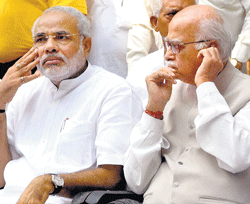
Thus far, Narendra Modi has got what he wanted in his career by holding on to, as he says, the philosophy of his life; “Don't dream of becoming..., dream of doing… Keep doing and let it find its own way.”
But, as Chief Minister Narendra Modi steps out of his comfort zone of Gujarat to take up, possibly, a much more difficult national responsibility which many in the BJP want him to take on, there are many things, say political commentators, that the Hindutva poster boy will have to “learn” and “unlearn”.
Modi’s political graph went up after becoming the Gujarat CM for the fourth time in succession – a feat he claims he achieved through his development politics and which made him a claimant for the party’s prime ministerial post.
He has been able to catch eyeballs during his interactions in the national capital, whether at a Delhi University college or at FICCI, due to his ability to exploit the disenchantment of the delivery oriented middle class with the UPA government’s misgovernance by narrating his contrasting success stories that seemingly helped him to take his state on the right path. Some of them though the critics have found overstretched.
Comparing the two models of governance offered by Congress vice president and Gujarat CM, political commentator N Bhaskara Rao, who works for Centre for Media Studies, told Deccan Herald that Rahul Gandhi’s approach is reluctant and passive while Modi’s is active. “Gandhi is trying to address mindset of people but he is not explaining his vision to larger public, while Modi is trying to get votes selling his feasible ideas directly”.
“What appeals is that for each of the middle class, Modi has something to talk about,” says Mumbai-based IT professional-cum-political analyst Jai Murg.
But, many leaders within the BJP believe that the basic handicap with Modicraft is his lack of trust in consensus building style of functioning, perceived anti-minority image that has potential to split the anti-Congress vote which would make the job of the right wing party more difficult, itching to come to power at the centre after two back to back general polls defeat since 2002.
Due to the communal tag Modi dons for the 2002 riots in his state, NDA partners like JD(U) are already threatening to walk out of the largest conglomeration of opposition parties.
Bhaskara Rao believes that he needs to imbibe moderation to realise the strength of consensus and inclusive politics that forms basic strength of this democratic country which cannot be demolished.
Similarly, Murg says, “Godhra incident has lived its political utility and Modi also recognizes that fact. The challenge for Modi would be to alter his style of governance so that he learns and unlearns in the process”.
Related articles: